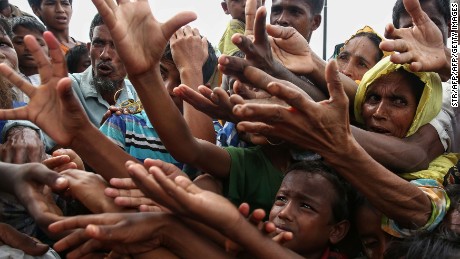Though the Myanmar refugees fled Rakhine state and have taken refuge in Bangladesh to save themselves from Buddhist attacks, however they are facing a new threat in Bangladesh. Rohingya Muslims are deprived of all basic necessities including food and drinking water in refugee camps at Cox’s Bazar. Women are driven to prostitution for some money and bread. They are exploited by none other than Bangladeshi Muslims. According to a shocking revelation by Reuter many Rohingya women admitted that hunger and necessity have pushed them to desperate measures as flesh trading.
Over 600,000 Rohingya Muslims have fled attacks by the Burma army since late August, fleeing across to border to southern Bangladesh. In Kutupalong, the biggest camp, the sex industry is thriving. According to Noor who works as a fixer at least 500 Rohingya prostitutes live in Kutupalong. The camp was established in 1992.
Saba Zariv, an expert on gender-based violence at the UN’s population agency UNFPA said that “It’s hard to come by numbers and we don’t collect data on how many sex workers are in the camps.”
Women don’t sleep with other Rohingya but meet their Bangladeshi clients outside the camps. Their camp inmates often turn a blind eye to prostitution. Many of the prostitutes are young girls who eat no more than one meal a day and don’t attend school. One such girl is Rena, 18, who has lived in the camp for the past decade. She was married off to an alcoholic two years ago. She was mistreated and beaten by her husband. Her abusive husband left her when she gave birth to her first son. When feeding her child became impossible, she decided to become a sex worker. She says with tears in her eyes, “it was out of desperation. I needed money.”
Another girl Romida had been left hungry and malnourished and saw prostitution as the only way she could survive. ‘I didn’t have a choice,’ said Romida who got 1,000 Taka (£9.20) from her first client. She says the current rate is 200 Taka (£1.84) and the fixer takes half of it.
Fourteen-year-old Kamru, says “The camp is all I remember. I grew up here, but I was always hungry.”
Sharing common traits like poverty, abusive family members and lack of funds, sex workers are vulnerable enough to be trafficked into the camp’s sex industry. The risk of trafficking will grow if aid agencies can’t manage to provide people with their basic needs.
Among their clients are men of all backgrounds – from university students to local politicians.

